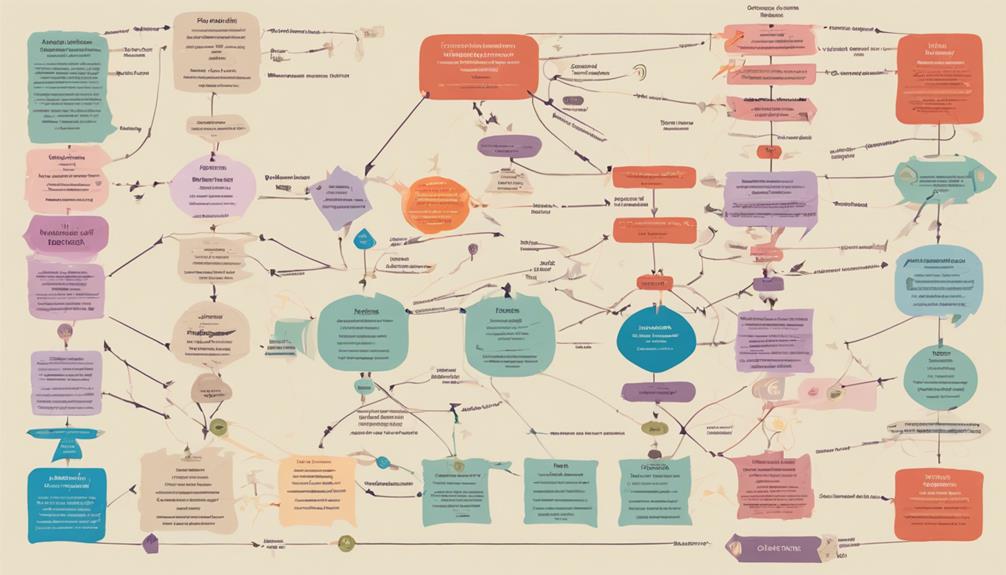Picture a garden where various plants flourish side by side, each requiring distinct care and attention to bloom.
Similarly, in the realm of relationships, ethical non-monogamy serves as a diverse garden of love and connection.
As we explore the intricacies of this dynamic landscape, we uncover the beauty and challenges that come with nurturing multiple emotional bonds.
Curious to unravel the complexities and rewards of cultivating such a garden?
Key Takeaways
- Clear communication and mutual understanding are foundational in ethical non-monogamous relationships.
- Establish boundaries, desires, and expectations to foster trust and emotional safety.
- Embrace ethical principles for trust, emotional safety, and authenticity in relationships.
- Differentiate ethical non-monogamy from cheating through honesty and open communication.
Understanding Ethical Non-Monogamy Dynamics
In exploring the realm of Ethical Non-Monogamy Dynamics, it becomes evident that clear communication and mutual understanding form the bedrock of these relationships. Within ethical non-monogamous relationships, people engage in romantic or sexual connections with multiple partners, all based on open communication and mutual consent. This foundation of ethicality ensures that each partner is respected, heard, and valued in the relationship dynamic. By openly discussing boundaries, desires, and expectations, individuals in such relationships establish a framework that promotes trust and emotional safety.
The essence of ethical non-monogamous relationships lies in the deep respect partners have for each other's autonomy and feelings. It's through honest and compassionate communication that these connections flourish. By embracing the principles of ethicality, individuals navigate the complexities of multiple partnerships with grace and understanding. The beauty of these relationships lies in the shared commitment to honesty, respect, and consent, fostering an environment where love can thrive authentically.
Types of Non-Monogamous Relationships

Exploring the diverse landscape of non-monogamous relationships reveals a spectrum of dynamics that encompass varied forms of romantic and sexual connections. Within the realm of ethical non-monogamy (ENM), individuals navigate relationships that suit their needs while upholding values of honesty, consent, and respect.
Here are some common types of non-monogamous relationships:
- Polyamorous Relationships: Involving multiple partners with emotional connections and mutual consent.
- Open Relationships: Primary partners engage in consensual sexual activities with others while maintaining their relationship.
- Swinging: Partners exchange for sexual encounters in social settings with clear consent and boundaries.
- Relationship Anarchy: Prioritizes personalized agreements between partners over traditional labels and hierarchies.
- Ethical Considerations: ENM encompasses various relationship dynamics that emphasize ethical practices, open communication, and respect for all involved parties.
Navigating these different dynamics requires effective communication, ongoing consent, and a deep understanding of the desires and boundaries of all partners involved.
Navigating Ethical Non-Monogamy Vs. Other Dynamics
Understanding the distinctions between ethical non-monogamy and other relationship dynamics requires a nuanced approach that values consent, communication, and mutual respect. In ethical non-monogamous relationships, honesty, and open communication are paramount, distinguishing them from traditional monogamous dynamics. These relationships prioritize mutual agreement and transparency, contrasting with cheating, which involves deception and betrayal.
Navigating ethical non-monogamy involves understanding personal boundaries, desires, and effective communication skills to ensure that all parties involved feel heard and respected. Research indicates that individuals in non-monogamous relationships often experience high levels of trust and personal growth, fostering a deeper connection with their partners.
Challenges in Ethical Non-Monogamous Relationships

Navigating the intricacies of ethical non-monogamous relationships often presents individuals with various challenges that require open communication, introspection, and a deep understanding of diverse preferences and needs within the relationship dynamic. Prejudice against non-monogamous relationships contributes to challenges, with societal misconceptions impacting individuals.
Jealousy and possessiveness are common hurdles faced in ethical non-monogamous relationships, requiring open communication and introspection. Understanding diverse preferences and needs within relationships is vital to navigating challenges in ethical non-monogamy successfully. Respecting boundaries and effectively communicating about preferences are crucial aspects in maintaining healthy ethical non-monogamous relationships.
Myths and misconceptions about non-monogamous relationships can create additional obstacles, requiring education and awareness to overcome. In facing these challenges, it's essential to approach each issue with empathy, patience, and a willingness to learn and grow together.
Benefits of Ethical Non-Monogamy
In ethical non-monogamous relationships, fostering higher levels of trust and personal growth is a cornerstone that contributes significantly to the well-being of individuals involved. Enhanced communication skills, freedom, and trust are prevalent benefits experienced in ethical non-monogamous relationships.
By exploring sexuality and nurturing intimacy within these relationships, individuals often experience heightened self-awareness and personal development. Ethical non-monogamy allows for the formation of diverse connections while upholding mutual respect and understanding. The benefits extend to enriched emotional connections, personal fulfillment, and the opportunity for profound self-discovery within relationships.
Embracing ethical non-monogamy can lead to a deeper understanding of oneself and others, fostering growth on both individual and relational levels. This journey of exploration and connection in ethical non-monogamous dynamics can pave the way for transformative experiences that nurture intimacy, trust, and personal development, ultimately enriching the lives of those involved in such relationships.
Frequently Asked Questions
What Is the Ethical Non-Monogamy Dynamic?
The ethical non-monogamy dynamic involves consensual relationships with multiple partners, emphasizing honesty, openness, and respect. It includes structures like polyamory, open relationships, and swinging, where partners agree on boundaries and dynamics. Communication, consent, and considering partners' feelings are key.
This dynamic allows for diverse relationship configurations, from primary partnerships to non-hierarchical connections. Establishing agreements on commitment levels, boundaries, and emotional involvement is crucial in navigating ethical non-monogamous relationships.
What Is the ENM Relationship Dynamic?
We believe the ENM relationship dynamic is about fostering mutual understanding, respect, and open communication among partners to navigate multiple romantic or sexual connections.
It involves establishing unique parameters regarding emotional involvement, interaction boundaries, and commitment levels within the relationship.
Prioritizing honesty and clear communication is key in creating fulfilling and healthy connections with multiple partners.
Understanding and respecting each other's boundaries is crucial in the ENM relationship dynamic.
Is ENM the Same as Swinging?
Yes, ethical non-monogamy (ENM) isn't exactly the same as swinging. While swinging is a type of ENM, it's more focused on sexual activities with others within committed relationships.
ENM, on the other hand, encompasses a broader spectrum of relationship styles beyond just recreational encounters. Both emphasize communication and consent, but swinging is a specific practice within the diverse world of ENM, offering unique experiences compared to other relationship dynamics.
What Is Cheating in Enm?
Cheating in any relationship, including ethical non-monogamy, involves breaching trust through actions outside agreed boundaries. It's like planting seeds of doubt in a garden of trust.
To us, it's crucial to remember that cheating disregards consent, honesty, and transparency. It's a betrayal that undermines the very foundation of a relationship.
In ENM, we prioritize open communication and mutual respect to prevent such hurtful actions.
Can You Recommend a Book on Ethical Non-Monogamy for Understanding Relationship Dynamics?
Looking for comprehensive ethical nonmonogamy books to understand relationship dynamics? “The Ethical Slut” by Janet W. Hardy and Dossie Easton is a must-read. This book provides valuable insights into navigating nontraditional relationship structures with honesty, respect, and integrity.
Conclusion
In exploring ethical non-monogamy, we uncover a tapestry of relationships woven with trust, communication, and understanding. Like branches reaching towards the sun, these dynamics branch out into a world of possibilities, challenging norms and fostering growth.
As we navigate the complexities of love and connection, let's embrace the diversity of relationship dynamics, each thread contributing to the rich fabric of human experience. Let empathy guide our hearts, and may we find solace in the ever-evolving landscape of ethical non-monogamy.









